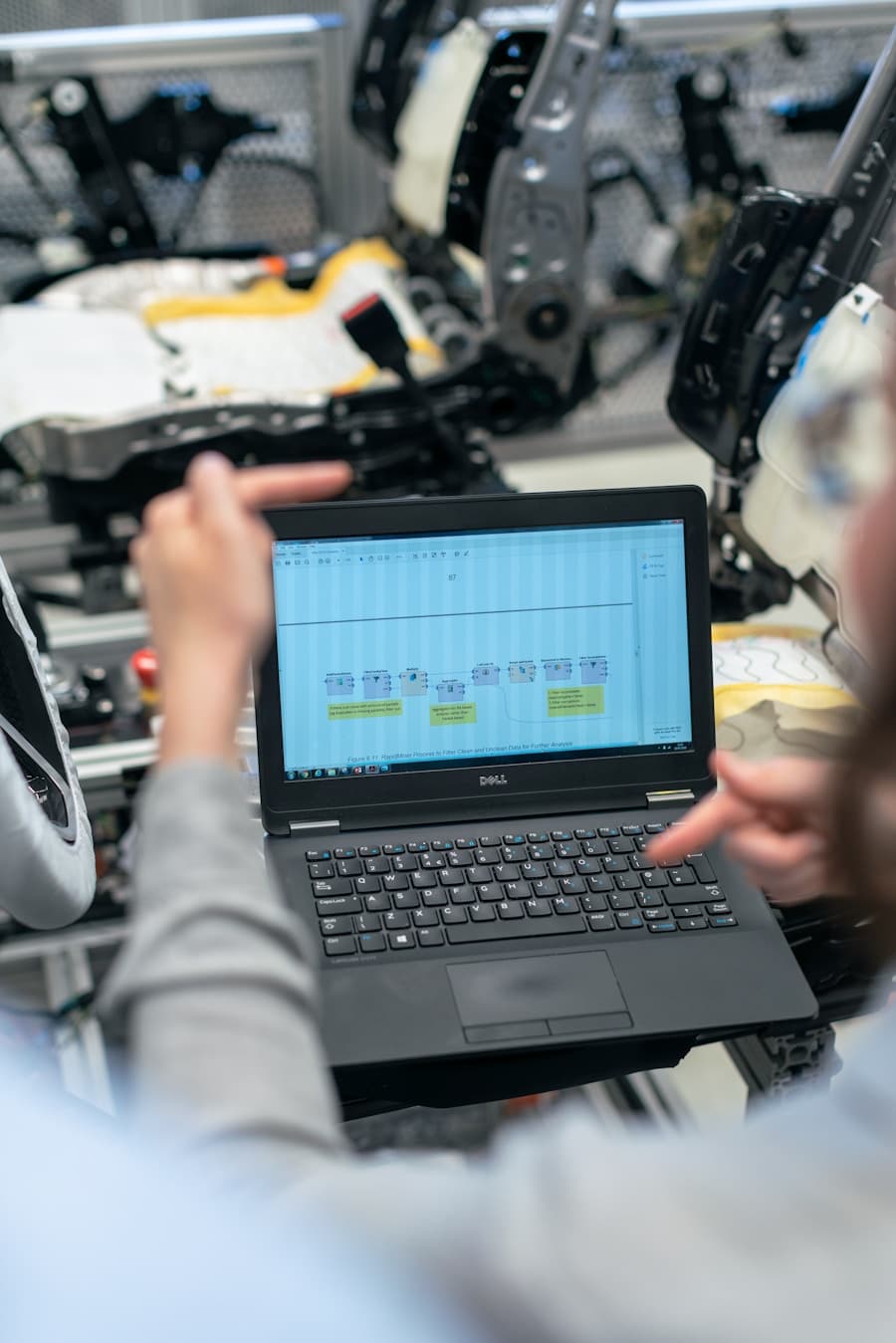The automotive industry is undergoing a transformative shift, driven by advancements in technology and the increasing complexity of vehicle systems. At the forefront of this evolution is the integration of artificial intelligence (AI) into simulation processes for automotive testing. AI-enabled simulation leverages sophisticated algorithms and machine learning techniques to create virtual environments that replicate real-world conditions, allowing manufacturers to test and validate vehicle performance, safety, and reliability without the need for extensive physical prototypes.
This approach not only accelerates the development cycle but also enhances the accuracy of testing outcomes, making it a pivotal tool in modern automotive engineering. As vehicles become more advanced, incorporating features such as autonomous driving, electric powertrains, and connected technologies, the traditional methods of testing are proving inadequate. The complexity of these systems necessitates a more nuanced approach to testing that can accommodate a multitude of variables and scenarios.
AI-enabled simulation provides a solution by enabling engineers to model intricate interactions within vehicle systems and predict their behavior under various conditions. This capability is essential for ensuring that vehicles meet stringent safety standards and performance benchmarks before they hit the market.
Key Takeaways
- AI-enabled simulation is revolutionizing automotive testing by providing a virtual environment for testing and validation.
- Current challenges in automotive testing include the high cost, time-consuming nature, and limitations of physical testing.
- AI-enabled simulation offers advantages such as cost reduction, faster testing cycles, and the ability to test in diverse and extreme conditions.
- Artificial intelligence plays a crucial role in automotive testing by enabling predictive modeling, scenario generation, and real-time analysis of data.
- Potential applications of AI-enabled simulation in automotive testing include autonomous vehicle testing, vehicle dynamics analysis, and crash simulations.
Current Challenges in Automotive Testing
Automotive testing faces numerous challenges that can hinder the efficiency and effectiveness of the development process. One significant issue is the high cost associated with physical testing. Building prototypes and conducting real-world tests can be prohibitively expensive, especially when multiple iterations are required to refine a design.
Additionally, the time required for physical testing can delay product launches, impacting a manufacturer’s competitiveness in a rapidly evolving market. Another challenge is the increasing complexity of vehicle systems. Modern vehicles are equipped with a myriad of sensors, control units, and software components that interact in sophisticated ways.
Testing these systems in isolation may not accurately reflect their performance in real-world scenarios. Furthermore, regulatory requirements are becoming more stringent, necessitating comprehensive testing across various conditions and use cases. This complexity demands innovative solutions that can streamline the testing process while ensuring compliance with safety and performance standards.
Advantages of AI-Enabled Simulation for Automotive Testing

AI-enabled simulation offers several advantages that address the challenges faced in automotive testing. One of the most significant benefits is the ability to conduct extensive virtual testing without the need for physical prototypes. This not only reduces costs but also accelerates the development timeline.
Engineers can quickly iterate on designs, test multiple configurations, and analyze outcomes in a fraction of the time it would take using traditional methods. Moreover, AI algorithms can analyze vast amounts of data generated during simulations to identify patterns and insights that may not be immediately apparent through manual analysis. This data-driven approach enhances decision-making processes, allowing engineers to make informed choices about design modifications and optimizations.
Additionally, AI-enabled simulations can incorporate real-time data from various sources, such as traffic patterns or environmental conditions, to create more realistic testing scenarios that better predict vehicle performance in actual driving conditions.
The Role of Artificial Intelligence in Automotive Testing
Artificial intelligence plays a crucial role in enhancing the capabilities of automotive testing through its ability to process and analyze large datasets efficiently. Machine learning algorithms can be trained on historical data from previous tests to identify correlations and predict outcomes for new designs. This predictive capability allows engineers to focus their efforts on areas that are most likely to yield significant improvements in performance or safety.
Furthermore, AI can facilitate adaptive testing methodologies that evolve based on real-time feedback from simulations. For instance, if a particular design iteration exhibits unexpected behavior during a simulation, AI systems can automatically adjust parameters or suggest alternative testing scenarios to explore potential solutions. This dynamic approach not only improves the robustness of testing but also fosters innovation by encouraging engineers to explore unconventional design paths that may have been overlooked in traditional testing frameworks.
Potential Applications of AI-Enabled Simulation in Automotive Testing
The applications of AI-enabled simulation in automotive testing are vast and varied, spanning multiple aspects of vehicle development.
By simulating various collision angles, speeds, and vehicle configurations, manufacturers can assess safety features and make necessary adjustments before physical crash tests are conducted.
Another significant application lies in the realm of autonomous vehicle testing. AI-enabled simulations can create complex urban environments with dynamic elements such as pedestrians, cyclists, and other vehicles. This allows developers to rigorously test autonomous driving algorithms under diverse conditions without the risks associated with real-world testing.
Additionally, these simulations can be used to evaluate how autonomous systems respond to rare or unpredictable events, ensuring that vehicles are equipped to handle a wide range of scenarios safely.
Impact of AI-Enabled Simulation on Automotive Industry

The integration of AI-enabled simulation into automotive testing is reshaping the industry landscape by fostering innovation and enhancing competitiveness. Manufacturers that adopt these advanced simulation techniques can significantly reduce their time-to-market for new vehicles while maintaining high standards of quality and safety. This agility is particularly crucial in an era where consumer preferences are rapidly changing, and technological advancements are occurring at an unprecedented pace.
Moreover, AI-enabled simulation contributes to sustainability efforts within the automotive industry by minimizing waste associated with physical prototyping and testing. By reducing the number of physical models required for testing purposes, manufacturers can lower their material consumption and carbon footprint. This aligns with the growing emphasis on environmentally responsible practices within the industry and resonates with consumers who are increasingly concerned about sustainability.
Future Developments and Innovations in AI-Enabled Simulation for Automotive Testing
Looking ahead, the future of AI-enabled simulation in automotive testing is poised for remarkable advancements driven by ongoing research and technological innovations. One area of focus is the enhancement of virtual reality (VR) and augmented reality (AR) technologies within simulation environments. By integrating VR and AR into testing processes, engineers can immerse themselves in realistic virtual scenarios, allowing for more intuitive analysis and decision-making.
Additionally, as data collection methods continue to evolve—particularly with the rise of connected vehicles—AI-enabled simulations will become even more sophisticated. The ability to harness real-time data from vehicles on the road will enable simulations to reflect current driving conditions more accurately than ever before. This could lead to breakthroughs in predictive maintenance, where simulations anticipate potential failures based on driving patterns and environmental factors.
Furthermore, advancements in quantum computing may revolutionize AI algorithms used in simulations by enabling them to process vast datasets at unprecedented speeds.
The Future of AI-Enabled Simulation for Automotive Testing
The future of AI-enabled simulation for automotive testing is bright, characterized by continuous innovation and an unwavering commitment to improving vehicle safety and performance. As manufacturers increasingly recognize the value of integrating AI into their testing processes, we can expect to see a paradigm shift in how vehicles are developed and validated. The ability to simulate complex interactions within vehicle systems will not only enhance product quality but also foster a culture of innovation that drives the industry forward.
In this rapidly evolving landscape, collaboration between automakers, technology companies, and regulatory bodies will be essential to harness the full potential of AI-enabled simulation. By working together to establish best practices and standards for simulation methodologies, stakeholders can ensure that advancements benefit not only manufacturers but also consumers who demand safer, more reliable vehicles. As we move into this new era of automotive engineering, AI-enabled simulation will undoubtedly play a central role in shaping the future of transportation.
In a recent article on ENICOMP, the founder of a sustainable energy company shared their journey in realizing the potential of sustainable energy (source). This article provides valuable insights into the growing importance of sustainable energy in the automotive industry, which aligns with the advancements in AI-enabled simulation for automotive testing discussed in “The Future of AI-Enabled Simulation for Automotive Testing.” Both articles highlight the innovative technologies shaping the future of transportation and energy efficiency.
FAQs
What is AI-enabled simulation for automotive testing?
AI-enabled simulation for automotive testing refers to the use of artificial intelligence (AI) to simulate and test various scenarios and conditions in the automotive industry. This technology allows for more efficient and accurate testing of vehicles and their components, leading to improved safety and performance.
How does AI-enabled simulation benefit automotive testing?
AI-enabled simulation offers several benefits for automotive testing, including cost savings, faster testing processes, and the ability to test a wide range of scenarios and conditions. It also allows for the identification of potential issues and improvements in vehicle design and performance.
What are some examples of AI-enabled simulation in automotive testing?
Examples of AI-enabled simulation in automotive testing include virtual crash testing, aerodynamic simulations, and testing of autonomous driving systems. These simulations can help automotive engineers and designers to identify potential safety hazards, improve vehicle performance, and optimize fuel efficiency.
What are the challenges of AI-enabled simulation for automotive testing?
Challenges of AI-enabled simulation for automotive testing include the need for high-quality data, the complexity of simulating real-world conditions, and the requirement for advanced computing power. Additionally, ensuring the accuracy and reliability of AI-enabled simulations is crucial for their effectiveness in automotive testing.
What is the future outlook for AI-enabled simulation in automotive testing?
The future of AI-enabled simulation for automotive testing looks promising, with continued advancements in AI technology, simulation software, and computing power. This technology is expected to play a crucial role in the development of safer, more efficient, and innovative vehicles in the automotive industry.

